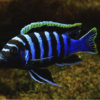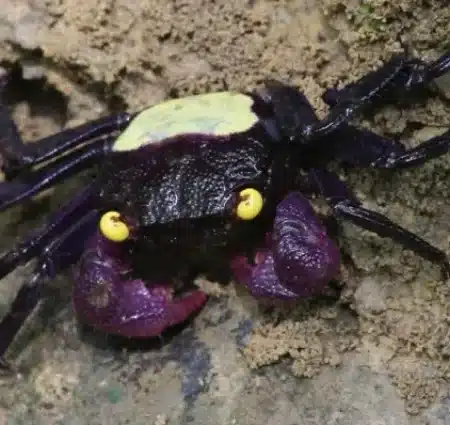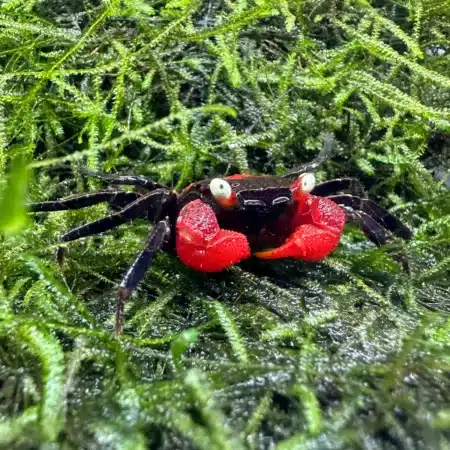Golden Mbuna Cichlid, Aurat Melanochromis Auratus Nyasa – Malawi Cichlid, Expertly Bred for Vibrancy, A Must-Have Species for Serious Cichlid Enthusiasts and Hobbyists
£9.49 Original price was: £9.49.£7.74Current price is: £7.74.
Welcome the stunning Golden Mbuna Cichlid, a vibrant addition to your aquarium. Known for its beautiful golden hue and unique patterns, this Malawi Cichlid thrives in community tanks. Perfect for aquarists seeking elegant and colorful fish to enhance their underwater landscape.
999 in stock
Species Introduction
The Golden Mbuna Cichlid, scientifically known as Aurat Melanochromis Auratus, is a stunning freshwater fish native to the rocky shores of Lake Malawi in East Africa. This vibrant species is a member of the Cichlidae family, known for its striking coloration and dynamic behavior. The Golden Mbuna Cichlid is particularly admired for its bright yellow and black markings, which make it a favorite among aquarists looking to enhance the visual appeal of their aquarium. In its natural habitat, this cichlid thrives in rocky environments where it can find plenty of hiding spots and territories to establish. The Golden Mbuna Cichlid is not only a beautiful addition to any aquarium but also offers unique challenges and rewards for fish keepers who are eager to learn about cichlid behavior and care.
Care Requirements Dashboard
| Optimal Living Conditions | |
|---|---|
| Water Temperature | 24-27°C (75-81°F) |
| pH Level | 6.5-7.5 |
| Water Hardness | 4-12 dKH |
| Minimum Tank Size | 80L (20 gal) |
| Salinity | Freshwater |
| Care Level | Beginner Friendly |
Natural Behavior & Temperament
Golden Mbuna Cichlids are known for their lively and aggressive nature, particularly during breeding seasons. They exhibit territorial behavior, especially males, who will defend their chosen space vigorously. In a well-planned aquarium, these fish can display fascinating social interactions, often establishing hierarchies among themselves. It is essential to provide ample hiding spots and territories to reduce aggression and stress levels. Observing their swimming patterns can be a delight, as they often dart in and out of rocky crevices, showcasing their vibrant colors. Their behavior can vary significantly based on tank mates and environmental conditions, making them an engaging species for aquarists who enjoy studying fish behavior.
Tank Setup Guide
Creating an ideal environment for Golden Mbuna Cichlids is crucial for their well-being. A minimum tank size of 75 gallons is recommended, as these fish thrive in spacious environments. The substrate should consist of fine gravel or sand to mimic their natural habitat. Incorporating plenty of rocks and caves will provide hiding spots and territories, essential for reducing aggression. Plants can be added, but they should be hardy species that can withstand the cichlid’s digging behavior. The use of a robust filtration system is vital to maintain water quality, as cichlids can be sensitive to poor conditions. Additionally, ensuring proper water flow will help simulate their natural environment, promoting healthy behaviors and reducing stress.
Water Quality Management
Maintaining optimal water quality is essential for the health of Golden Mbuna Cichlids. The ideal pH range for these fish is between 7.8 and 8.6, with a temperature between 75°F and 82°F. Regular water changes of 20% to 30% weekly will help keep nitrate levels low and maintain water clarity. It is also important to monitor hardness, aiming for a range of 10 to 20 dGH, as these fish prefer harder water conditions. Utilizing a high-quality aquarium test kit will allow you to keep track of these parameters effectively. Additionally, ensure that the filtration system is adequate for the tank size, as cichlids can produce a significant amount of waste. Regularly cleaning the filter media and ensuring proper circulation will contribute to a stable and healthy environment.
Feeding & Nutrition
Golden Mbuna Cichlids are primarily herbivorous, but they also require a balanced diet that includes protein sources. High-quality cichlid pellets, spirulina flakes, and frozen or live foods such as brine shrimp and bloodworms can be offered to ensure a well-rounded diet. Feeding should occur 2-3 times a day, providing only what they can consume in a few minutes to prevent overfeeding and maintain water quality. It is essential to vary their diet to promote health and coloration, as well as to mimic their natural feeding habits. Be mindful of their aggressive feeding behavior, as they may compete for food with tank mates. Observing their feeding patterns can provide insights into their health and well-being.
Compatibility Guide
When considering tank mates for Golden Mbuna Cichlids, it is crucial to select species that can tolerate their aggressive behavior. Suitable companions include other Malawi cichlids, such as the Yellow Lab (Labidochromis caeruleus) and the Blue Cichlid (Cynotilapia afra). Avoid keeping them with smaller or more docile species, as they may become targets for aggression. It is recommended to keep them in groups of at least three to mitigate territorial disputes, with a higher ratio of females to males to reduce aggression. Monitoring interactions closely during the initial introduction period is essential to ensure a harmonious community. Providing ample hiding spots and territories will also help in reducing conflicts and promoting a peaceful environment.
Health & Wellness
Golden Mbuna Cichlids are generally robust fish, but they can be susceptible to common cichlid diseases such as ich and fin rot. Regular observation is key to identifying any signs of distress or illness. Symptoms to watch for include changes in behavior, such as lethargy or loss of appetite, as well as physical signs like white spots, frayed fins, or abnormal swimming patterns. Maintaining water quality and a balanced diet will greatly reduce the risk of disease. In case of illness, prompt treatment is essential, and quarantining affected fish can help prevent the spread of disease to other tank mates. Keeping a well-stocked aquarium first aid kit will aid in quick responses to health issues.
Breeding Information
Breeding Golden Mbuna Cichlids can be a rewarding experience for aquarists willing to create the right conditions. These fish are mouthbrooders, meaning that females will carry and care for the eggs and fry in their mouths until they are ready to be released. To encourage breeding, provide a breeding tank with ample hiding spots and a sandy substrate. The ideal water parameters for breeding should be slightly warmer, around 78°F to 82°F, with stable pH and hardness levels. Once spawning occurs, the female will lay eggs in a sheltered area, and the male will fertilize them. After about three weeks, the fry will be released, and it is essential to provide them with small food options such as crushed flakes or infusoria until they are large enough to consume standard cichlid pellets.
Acclimation Process
Acclimating Golden Mbuna Cichlids to a new aquarium is a critical step in ensuring their health and reducing stress. Begin by floating the sealed bag containing the fish in the aquarium for about 15 minutes to equalize the temperature. After this, gradually introduce small amounts of tank water into the bag over the next hour. This slow acclimation process helps the fish adjust to the new water parameters. Once acclimated, gently release the fish into the tank, avoiding adding any of the bag water to the aquarium. Monitoring their behavior closely after introduction will help identify any signs of stress or aggression, allowing for timely adjustments if necessary.
Long-term Care
Golden Mbuna Cichlids can live for several years when provided with proper care. As they grow, their needs may change, requiring adjustments in tank setup, diet, and social dynamics. Regular water testing and maintenance will ensure a stable environment conducive to their health. As they mature, monitor their behavior closely, as territorial disputes may arise, particularly among males. Maintaining a balanced diet and providing enrichment through varied feeding practices will promote optimal health and coloration. Keeping a log of their growth and behavior can assist in identifying any changes that may require intervention.
Natural Habitat Recreation
To recreate the natural habitat of Golden Mbuna Cichlids, focus on mimicking the rocky environments of Lake Malawi. Incorporate a variety of rocks, caves, and crevices to provide hiding spots and breeding areas. The substrate should reflect their natural environment, using fine gravel or sand to allow for digging and burrowing behavior. Adding plants that are native to their habitat, such as Anubias or Java Fern, can enhance the aesthetic while providing additional cover. Proper lighting will also play a role in creating a natural ambiance, with a focus on providing shadows and highlights that mimic their natural surroundings.
Seasonal Care Adjustments
Seasonal changes can impact the care of Golden Mbuna Cichlids, particularly regarding temperature and lighting. During warmer months, ensure that the tank does not exceed the upper temperature limit, as overheating can lead to stress and health issues. Conversely, during colder months, maintaining a stable temperature within the recommended range is crucial. Adjusting the lighting schedule to mimic natural day/night cycles will help regulate their behavior and breeding patterns. Regular monitoring of water parameters will be essential during seasonal transitions to ensure a stable environment.
Expert Tips
For those looking to provide the best care for Golden Mbuna Cichlids, consider the following expert tips: First, always research potential tank mates thoroughly to avoid aggression and stress. Second, invest in a high-quality filtration system to maintain optimal water quality. Third, consider using a sponge filter for fry tanks to prevent small fish from being sucked into the filter. Lastly, engage with local aquarist communities or forums to share experiences and gain insights into cichlid care. Continuous learning and adaptation will ensure a thriving environment for these beautiful aquatic companions.
Troubleshooting
Common issues with Golden Mbuna Cichlids may include aggression, poor water quality, and health problems. To address aggression, ensure that there are enough hiding spots and territories. If you notice signs of poor water quality, such as cloudy water or high nitrate levels, perform a water change and clean the substrate. For health issues, observe for any behavioral changes or physical symptoms, and consult with a veterinarian specializing in fish if necessary. Keeping a detailed log of water parameters and fish behavior can help identify patterns and potential problems before they escalate.
Scientific Background
The Golden Mbuna Cichlid belongs to the diverse family of Cichlidae, which includes many species known for their vibrant colors and complex behaviors. This species is part of the Mbuna group, which are rock-dwelling cichlids that have adapted to life in the rocky substrates of Lake Malawi. Research into their behavior and ecology has revealed fascinating insights into their social structures and breeding habits. Conservation efforts in their native habitat are crucial, as overfishing and habitat degradation threaten their populations. Understanding the scientific background of Golden Mbuna Cichlids will enhance your appreciation for these remarkable fish.
Advanced Care Techniques
For experienced aquarists looking to take their care of Golden Mbuna Cichlids to the next level, consider implementing advanced techniques such as breeding programs or biotope aquariums. Breeding programs can involve selective breeding to enhance desirable traits, while biotope aquariums aim to replicate the exact conditions of Lake Malawi. Additionally, experimenting with different food types, such as homemade recipes or specialized cichlid diets, can promote optimal health and coloration. Engaging in regular research and staying updated on cichlid care advancements will further enhance your experience with these beautiful fish.
Frequently Asked Questions
Q: What tank size is required for Golden Mbuna Cichlids?
Golden Mbuna Cichlids thrive in a minimum tank size of 75 litres. This allows ample space for swimming and territorial behaviour, which is crucial for their well-being. A larger tank is preferable, ideally 100-150 litres, to accommodate more fish and reduce aggression. It’s essential to provide plenty of hiding spots using rocks and caves, as this mimics their natural habitat in Lake Malawi. Remember, these cichlids can be territorial, so providing sufficient space and structure helps mitigate conflict among tank mates.
✓ Expert Tip
Consider adding a larger group of cichlids to help distribute aggression, which can lead to a more harmonious tank environment.
Q: What water parameters do Golden Mbuna Cichlids require?
Golden Mbuna Cichlids prefer hard, alkaline water with a pH range of 7.8 to 8.6. The water temperature should be maintained between 24 to 28 degrees Celsius. Regular monitoring of ammonia, nitrite, and nitrate levels is essential, with ammonia and nitrite levels ideally at 0 ppm. Frequent partial water changes (about 20-30% weekly) will help maintain optimal water quality, which is crucial for their health. Utilizing a high-quality filtration system is recommended to keep the environment stable.
✓ Expert Tip
Consider using a mineral supplement to help maintain the necessary hardness and pH levels.
Q: How often should I feed Golden Mbuna Cichlids?
Golden Mbuna Cichlids should be fed a varied diet 2-3 times a day. High-quality cichlid pellets or flakes designed for herbivorous species are ideal, as they require a diet rich in vegetable matter. Supplementing their diet with spirulina flakes, blanched vegetables, and occasional protein sources like brine shrimp can enhance their colouration and overall health. Be cautious not to overfeed, as uneaten food can pollute the water, leading to health issues.
✓ Expert Tip
Use feeding rings to prevent food from floating away and ensure all fish have access to their meals.
Q: What are the best tank mates for Golden Mbuna Cichlids?
When selecting tank mates for Golden Mbuna Cichlids, it is crucial to choose species that can tolerate similar water parameters and are robust enough to handle their territorial nature. Other African cichlids that share similar habitats, such as other Mbuna species, are excellent choices. Avoid smaller or more docile species, as they may become targets for aggression. Additionally, ensure that the tank is spacious and well-structured to provide hiding spots, which can help reduce stress and territorial disputes.
✓ Expert Tip
Introduce new tank mates gradually to minimize stress and aggression during acclimatisation.
Q: How do I properly acclimatise Golden Mbuna Cichlids to my aquarium?
Acclimatising Golden Mbuna Cichlids is essential to reduce stress and ensure a smooth transition to their new environment. Start by floating the sealed bag containing the fish in the aquarium for about 15-20 minutes. This allows the water temperature to equalise. After that, gradually introduce small amounts of aquarium water into the bag over the next hour, allowing the fish to adjust to the water parameters. Finally, gently net the fish into the aquarium, discarding the bag water to prevent introducing any contaminants.
✓ Expert Tip
Consider using a drip acclimatisation method for a more gradual adjustment, especially for sensitive species.
Q: What are the signs of healthy Golden Mbuna Cichlids?
Healthy Golden Mbuna Cichlids exhibit vibrant colours, clear eyes, and active behaviour. They should swim confidently throughout the tank and exhibit normal feeding patterns. Watch for signs of stress or illness, such as lethargy, faded colours, or abnormal swimming patterns. Additionally, healthy cichlids will have smooth, unblemished scales and fins. Regular observation can help you catch any health issues early, allowing for timely intervention.
✓ Expert Tip
Keep a health journal to track any changes in behaviour or appearance, helping you identify potential issues sooner.
Q: How do I successfully breed Golden Mbuna Cichlids?
Breeding Golden Mbuna Cichlids can be a rewarding experience. To encourage breeding, provide a separate breeding tank with ample hiding spots and a sandy substrate. Males will often display vibrant colours and court females by performing elaborate swimming displays. Once a female is ready, she will lay eggs in a safe area, which she will then incubate in her mouth until they hatch. After about 3 weeks, the fry can be released into the main tank, but ensure they have a separate feeding space to avoid being eaten by adults.
✓ Expert Tip
Consider providing high-quality fry food to ensure the young fish grow strong and healthy.
Q: What temperature should I maintain for Golden Mbuna Cichlids?
Golden Mbuna Cichlids thrive in temperatures ranging from 24 to 28 degrees Celsius. It’s crucial to maintain a stable temperature, as fluctuations can induce stress and lead to health issues. Using a reliable aquarium heater with a thermometer can help achieve this. Ensure that the heater is appropriately sized for your tank and regularly check the temperature to ensure it remains within the optimal range for your fish.
✓ Expert Tip
Consider using a heater with a built-in thermostat for better temperature regulation.
Q: How long do Golden Mbuna Cichlids typically live in captivity?
In captivity, Golden Mbuna Cichlids can live for 8 to 10 years with proper care. Factors such as water quality, diet, and tank environment play significant roles in their lifespan. Maintaining stable water parameters, a balanced diet, and a well-structured habitat will contribute to their longevity. Regular health checks and prompt attention to any signs of illness are also important to ensure they lead a healthy life.
✓ Expert Tip
Consider keeping a water quality log to help track parameters over time, ensuring optimal conditions for your fish.
Q: What type of substrate is most suitable for Golden Mbuna Cichlids?
Golden Mbuna Cichlids prefer a sandy substrate that mimics their natural habitat in Lake Malawi. This type of substrate allows them to dig and forage, which is a natural behaviour for these fish. Avoid using sharp or jagged substrates, as these can injure their delicate fins. Additionally, incorporating smooth rocks and caves into the tank design provides hiding spots and territories, which are essential for their comfort and well-being.
✓ Expert Tip
Consider layering the substrate with larger rocks on the bottom for stability, topped with a fine sand layer for aesthetics and comfort.
Q: What behavioural patterns should I expect from Golden Mbuna Cichlids?
Golden Mbuna Cichlids are known for their vibrant personalities and territorial behaviour. They often establish and defend specific areas within the tank, which can lead to displays of aggression, particularly among males. Expect them to engage in courtship rituals, especially during breeding seasons, where males will showcase their colours and perform swimming displays to attract females. Additionally, they are generally active swimmers, often foraging for food amongst the rocks and substrate.
✓ Expert Tip
Provide plenty of hiding spots and territories to help reduce stress and minimise aggressive encounters.
Q: How can I prevent common diseases in Golden Mbuna Cichlids?
Preventing diseases in Golden Mbuna Cichlids involves maintaining optimal water quality, providing a balanced diet, and ensuring a stress-free environment. Regular water changes and monitoring for ammonia, nitrite, and nitrate levels can help prevent disease outbreaks. Quarantining new arrivals for at least two weeks before introducing them to the main tank is crucial to avoid introducing pathogens. Additionally, maintaining good tank hygiene and avoiding overcrowding will further reduce the risk of disease.
✓ Expert Tip
Consider adding aquarium salt to the water, as it can help reduce stress and prevent certain diseases.
Q: What lighting conditions do Golden Mbuna Cichlids prefer?
Golden Mbuna Cichlids prefer moderate lighting, which mimics their natural habitat. Too much bright light can cause stress, whilst too little can inhibit their natural behaviour. Using LED lights with a timer can create a consistent day-night cycle, promoting a healthy environment. It’s beneficial to include shaded areas in the tank using rocks or plants, allowing the fish to retreat if they feel exposed. This balance helps them thrive and exhibit their natural behaviours.
✓ Expert Tip
Consider using a dimmer switch for your lights to adjust brightness based on the time of day.
Q: How do I recognise stress in Golden Mbuna Cichlids?
Signs of stress in Golden Mbuna Cichlids can include excessive hiding, erratic swimming patterns, and loss of colour vibrancy. They may also display aggression towards tank mates or show signs of lethargy. Observing their feeding habits is crucial; a decrease in appetite often indicates stress. Additionally, watch for physical signs such as clamped fins or frayed fins, which can suggest underlying health issues. Addressing stress factors promptly is essential for their overall well-being.
✓ Expert Tip
Consider rearranging tank decor to reduce territorial disputes and provide new environments for exploration.
Q: What natural habitat conditions should I replicate for Golden Mbuna Cichlids?
To replicate the natural habitat of Golden Mbuna Cichlids, create a rocky environment that mimics the shoreline of Lake Malawi. Use smooth rocks, caves, and sandy substrate to provide hiding spots and territories. Maintain a stable temperature of 24-28 degrees Celsius and ensure alkaline water with a pH of 7.8-8.6. Additionally, incorporating plants such as Anubias or Java Fern can enhance the aesthetics of the tank while providing cover. Regular maintenance of water quality is key to mimicking their natural conditions effectively.
✓ Expert Tip
Consider adding driftwood to create additional structures and enhance the natural feel of the aquarium.













Emily Carter (verified owner) –
I recently added the Golden Mbuna Cichlid to my aquarium, and I couldn’t be happier! These vibrant fish are not only stunning to look at, but they also bring a lively energy to my tank. After about two weeks, I noticed how well they acclimated; they are very active swimmers and love to explore their environment. I’ve kept various Malawi cichlids before, but the Auratus truly stands out with its striking yellow and black coloration. I’ve set up plenty of hiding spots with rocks and caves, which they utilize beautifully. One minor concern is that they can be a bit territorial, especially during breeding season, so monitoring their interactions is a must. Overall, I would highly recommend these cichlids to any hobbyist looking to enhance their aquarium with a dynamic species. They thrive best in a well-maintained tank with similar-sized fish. Shipping was quick, and they arrived healthy, which shows the supplier cares about fish welfare. I would definitely purchase again!